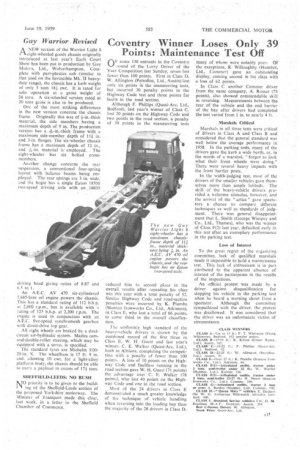Coventry Winner Loses Only 39 Points: Maintenance Test Off
Page 17

If you've noticed an error in this article please click here to report it so we can fix it.
OF some 130 entrants in the Coventry round of the Lorry Driver of the Year Competition last Sunday, seven lost fewer than 100 points. First in Class D, W. Allington (Petrofina, Ltd., Austin) lost only six points in the manceuvring tests, but incurred 30 penalty points in the Highway Code test and three points for faults in the road section.
Although F. Phillips (Quasi-Arc, Ltd., Bedford), last year's winner of Class C, lost 20 points on the Highway Code and two points in the road section, a penalty of 30 points in the manceuvring tests reduced him to second place in the overall results after repeating his class win this year with a total penalty of 52. Similar Highway Code and road-section penalties were incurred by K. Plurnbe (Stanton Ironworks Co., Ltd., Atkinson), in Class E. who lost a total of 66 .points, to come third in the overall classification.
The uniformly high standard of the heavy-vehicle drivers is shown by the combined record of the first three in Class E, W. H. Guest and last year's winner, C. E. Walker (Quasi-Arc, Ltd.), both in Albions, completing the competition with a penalty of fewer than 100 points. A loss of 10 points on the Highway Code and faultless running in the road section gave W. H. Guest (71 points) the advantage over C. E. Walker (78 points), who lost 40 points on the Highway Code and one in the road section.
Most of the 24 drivers in Class E demonstrated a much greater knowledge of the technique of vehicle handling when reversing into the loading bay than thc majority of the 28 drivers in Class D. many of whom were notably poor. Of the exceptions, R. Willoughby (Humber, Ltd., Commer) gave an outstanding display, coming second in his' class with a loss of 62 points.
In Class C another Commer driver from the same company, A. Rosser (75 points), also showed commendable skill_ in reversing.' Measurements between the. rear of the vehicle and the end barrier of the bay after drivers had completed the test varied from 1 in. to nearly 4 ft. .
Marshals Critical Marshals in all three tests were critical of drivers iti Class A and Class B and considered that the general standard was well below the average performance in 1958. In the parking tests, many of the drivers gave the kerb a wide berth, or, in the wads of a marshal, "forgot to look what their front wheels were doing." There were several heavy impacts with the front barrier posts.
In the width-judging test, most of the drivers of the smaller vehicles gave themselves more than . ample latitude. The skill of the heavy-vehicle drivers provided a welcome stimulus, however, and the arrival of, the " artics " gave spectators a chance to compare different techniques as well as standards of judgment. There was general disappointment that L. Smith (George Wimpey and Co., Ltd., Thames), who was the winner of Class F(2) last year, defaulted early in this test after an exemplary performance in the parking test, Loss of Interest
To the great regret of the organizing committee, lack of qualified marshals made it impossible to hold a maintenance test, This lack of enthusiasm is in part attributed to the apparent absence of interest of the participants in the results of the inspections.
An official protest was made by a driver against disqualification for stopping his vehicle in the parking test Nhen he heard a warning shout from a spectator. Although the committee sympathized with the driver, the protest was disallowed. It was considered that the driver was an unfortunate victim of .circumstance.




































































